-
The Differences in Lens Types for Glasses
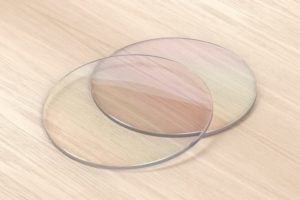 When you’re picking eyeglasses, you’re probably thinking about the frames. This makes sense because eyeglasses act as an accessory as well as improving your vision, and the frames are what anyone looking at you will notice. However, the lenses are actually the most important part of the glasses. Do you know the difference in the different types of lenses?
When you’re picking eyeglasses, you’re probably thinking about the frames. This makes sense because eyeglasses act as an accessory as well as improving your vision, and the frames are what anyone looking at you will notice. However, the lenses are actually the most important part of the glasses. Do you know the difference in the different types of lenses?- Glass glasses are largely a thing of the past. While glass was the only choice in the early days of vision correction, it poses a few problems. Glass lenses are effective at improving vision, but they’re heavy and easy to break. Today, technology has improved and given us many more options, so glass is no longer widely used for lenses.
- Plastic lenses have been in use since 1947. The first lightweight plastic eyeglass lenses were made of a plastic polymer called CR-39, and this kind of plastic is still a popular option for lenses today.
- Polycarbonate lenses came on the scene in the 1970s. This material was originally developed for Air Force helmet visors, as well as “bulletproof glass” used in locations like banks. It’s lighter and much more impact-resistant than CR-39 plastic, and it’s often used in children’s eyewear, safety glasses, and sports eyewear. Another benefit of polycarbonate lenses is that they have built-in UV protection.
- Trivex is a newer material similar to polycarbonate. This material also has impact-resistant properties but has the advantage of a higher Abbe value. The Abbe value of a lens material measures how widely the lens disperses different wavelengths of light. Lenses with a low Abbe value can have problems like colored halos, while a higher Abbe value means better optical quality.
- High-index plastic lenses are thin and lightweight. They have a higher index of refraction than CR-39, which means they refract light more effectively. You can choose high-index plastic lenses even if you need a strong prescription.
No matter what kind of lenses you choose, there are coatings that can be applied to cause them to function more efficiently.
- Anti-reflective coating: This coating helps with glare, reflections, and halos around light. This kind of coating makes lenses nearly invisible, for better eye contact, and it improves contrast and clarity, especially at night.
- Anti-scratch coating: Lightweight eyeglass lens materials are softer and more likely to be scratched than glass lenses. Anti-scratch coating, however, makes them nearly as scratch-resistant as glass.
- UV-blocking treatment: Perhaps the most important coating, this protects your eyes from UV rays, which can cause problems like macular degeneration and cataracts. Polycarbonate and most high-index plastic lenses have 100 percent UV protection built in, but CR-39 lenses need an additional coating.
When choosing the right lenses, it’s important to get the advice of your eye doctor. If you are looking for an eye doctor, the Gerstein Eye Institute in Chicago can help. Since 1968, the Gerstein Eye Institute has been providing exceptional ophthalmologic care to patients in the Chicago area. With decades of experience in ophthalmology, our certified professional staff members work hard to provide the kind of personalized care that keeps patients coming back year after year, eventually entrusting the eye health of their children and grandchildren to us as well. To schedule an appointment, call us at 773.596.9545 or contact us through our website.
-
How to protect your eyes when being active

Staying active is an important part of a healthy lifestyle. Unfortunately, participating in sports or other physical activities without protecting your eyes can lead to eye injuries that can harm your vision. You take the time to wear protective gear to prevent injury to the rest of your body; make sure you’re also considering your eyes.
Wearing your prescription glasses when you’re participating in an active pursuit is not a good idea, and regular sunglasses won’t properly protect your eyes. In fact, sometimes even safety goggles don’t go far enough to protect your sight. Some people may worry: does protective eyewear impede vision and thus, athletic performance? Experts say no. In fact, many players actually perform better when wearing protective eyewear, because they’re less afraid of injury.
It’s important to choose gear that suits your activity. Wearing baseball cleats on the basketball court would be ill-advised, and a figure skater would be unable to perform while wearing the padding of a hockey goalie. Similarly, the protective eyewear you choose must fit the way you use it. In most sports, you risk injury to your eyes from balls, equipment, or other players’ body parts hitting the face. Here’s a rundown of the right gear for the right sport:
- Baseball: A sturdy plastic or polycarbonate face guard, along with goggles or eye guards.
- Basketball: Goggles
- Soccer: Eye guards
- Football:Eye guards and a full face guard
- Hockey: A mask made of polycarbonate material or wire
- Tennis or racquetball: Goggles
The right materials are just as crucial as the right gear. According to experts, the best lenses for eye protection are made of ultra-strong polycarbonate. You can find protective eyewear at some sporting goods stores, or get it through your eye care provider. Make sure to choose eyewear that meets the standards set by the American Society for Testing and Materials.
If you are looking for an eye care provider, the Gerstein Eye Institute in Chicago can help. Since 1968, the Gerstein Eye Institute has been providing exceptional ophthalmologic care to patients in the Chicago area. With decades of experience in ophthalmology, our certified professional staff members work hard to provide the kind of personalized care that keeps patients coming back year after year, eventually entrusting the eye health of their children and grandchildren to us as well. To schedule an appointment, call us at 773.596.9545 or contact us through our website.
-
How to Get Relief from Eye Allergies

If you’re allergic to pollen, dust, mold or pet dander, you may struggle with watery, swollen, itchy eyes. Thankfully, at-home and prescription remedies are available. Here are some different approaches you can take to get relief from eye allergies.
At-Home Remedies for Preventing and Relieving Mild Eye Allergies
For many people, it’s possible to avoid allergy triggers and relieve symptoms with DIY methods. Here’s what to try first.
- Keep the windows shut, especially in the morning and evening when pollen counts tend to be at their highest.
- Cover pillows with hypoallergenic pillowcases to reduce your exposure to dust mites, and wash your bedding weekly in hot water.
- Keep your pet out of the bedroom to reduce your exposure to pet dander while you sleep.
- Dust and mop often to remove pet hair and dust from hard surfaces.
- Wear wraparound sunglasses to protect your eyes from pollen when mowing the lawn or engaging in other outdoor activities.
- Remove your contact lenses, which can attract airborne allergens. Consider wearing eyeglasses throughout allergy season.
- Gently clean your eyelids before bed to remove pollen and other allergens that could irritate your eyes while you sleep.
- Place a cool washcloth on your eyes to relieve swelling and itching.
- Rinse your eyes with saline solution or artificial tears to help flush out allergens.
- Apply allergy eye drops to combat your symptoms. Wait at least 15 minutes before putting in contact lenses.
- Take oral antihistamines or other over-the-counter allergy medications.
Prescription Remedies for Moderate to Severe Eye Allergies
When DIY methods aren’t enough to combat your persistent symptoms, ask your eye doctor what other options are available. Here are some prescription eye drops and oral medications you may want to try.
- Antihistamines reduce eye allergy symptoms by blocking histamine cells that generate an allergic response.
- Decongestants help you breathe easier by shrinking swollen nasal passages. They also relieve redness by reducing the size of blood vessels in the whites of your eyes.
- Mast cell stabilizers prevent mast cells from releasing histamines. Because it takes weeks for mast cells to reach their full potential, you should take this medicine as a preventatives measure rather than a treatment for existing symptoms.
- Nonsteroidal anti-inflammatory drug (NSAID) eye drops decrease swelling caused by seasonal allergic conjunctivitis, also known as hay fever.
- Corticosteroid eye drops relieve acute eye allergy symptoms. They are designed for short-term use only because of the complications that can arise with prolonged use.
- Immunotherapy is a treatment for people with severe allergies. You achieve long-term relief after a few months of injections that help you build up immunity to certain
Eye allergies aren’t the other thing that can affect your eye health. Keep your vision clear with regular visits to Gerstein Eye Institute. To schedule an eye exam in Chicago, IL, please contact us at 773.596.9545 today. We have been offering preventative eye care since 1968.
-
Everything You Need to Know about Contact Lenses
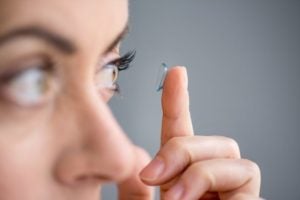 Are you tired of your glasses fogging up or getting in the way of the activities you love? If so, it could be time to try contact lenses, a vision correction option that millions of people utilize today. Learn more about contact lenses before you make the switch.
Are you tired of your glasses fogging up or getting in the way of the activities you love? If so, it could be time to try contact lenses, a vision correction option that millions of people utilize today. Learn more about contact lenses before you make the switch.Brief History of Contact Lenses
In the 1500s, Leonardo da Vinci became the first person to conceptualize wearing corrective lenses directly on the eye. However, it wasn’t until 1887 that the first glass contact lenses were manufactured.
Drastic advancements have been made in the field of contact lenses over the last 80 years. The materials used have evolved from glass to plastic to acrylate to silicone-hydrogel, and the structure has changed from covering the entire eye to just the cornea. Contacts are more comfortable and breathable today than ever before.
Types of Contact Lenses
- Soft lenses range from daily disposables to two- and four-week lenses that require cleaning and storage between each use.
- Rigid gas-permeable (RGP) lenses are harder and smaller than soft lenses. You get crisp, clear vision from lenses that last a year or two, but they may be uncomfortable at first.
- Scleral lenses cover more of the eye. They are suggested for people with irregular corneas or severe dry eye.
- Toric lenses are available in soft and RGP form. They are shaped to correct astigmatism, which is when the cornea is pointed rather than spherical.
Contact Lens Eye Exams
The exams for prescribing contact lenses are more in-depth than regular eye exams. In addition to checking your vision to determine your prescription, the exam also assesses the shape and health of your eyes to ensure you’re a good candidate for contact lenses.
If you’re new to contacts, your eye doctor will select trial lenses for you to test out. You’ll receive instructions for putting them in and taking them out, and you’ll wear these contacts home to see how you like them. You may need a follow-up exam to discuss any discomfort and try other styles and brands. When you’re ready, your eye doctor will help you order a one-year supply of the contacts you prefer.
Contact Lens Tips
- Wash and dry your hands before putting contacts in or taking them out.
- Put in your contacts before applying eye makeup.
- Don’t sleep, swim or shower while wearing contact lenses.
- Store your contacts in fresh contact lens solution every night.
- Replace your contacts as often as your eye doctor recommends.
Contact lenses are the right solution for many people who require vision correction. If you’re interested in trying out contacts for the first time, call Gerstein Eye Institute at 773.596.9545. We’ll set up an eye exam for you at our Chicago, IL office, where our eye doctor will fit you with the proper lenses and teach you how to insert and remove them correctly. We’ll also explain how to clean and store contact lenses to help keep your eyes healthy.
-
What are cataracts?
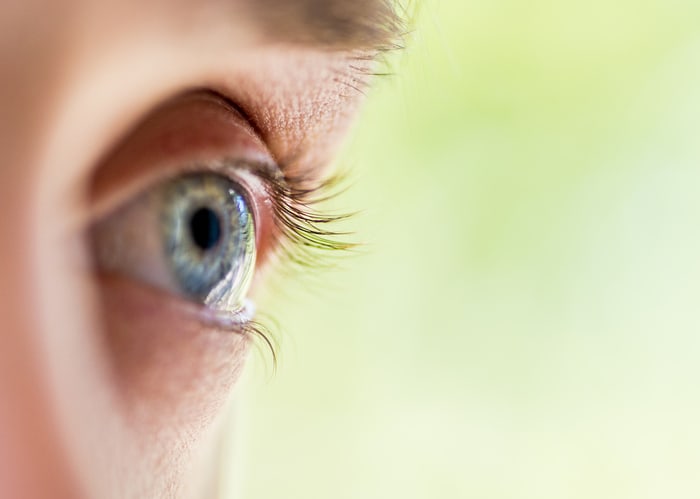
How much do you know about cataracts? Cataracts are extremely common, affecting more than 20.5 million Americans over the age of 40. In fact, by age 65, it’s estimated that more than 90% of people in the United States will develop cataracts, and by the time they’re 75, those cataracts will have a major impact on their vision. Knowing those statistics, it’s a good idea to know a little bit about cataracts.
- What is a cataract? Typically found in people over age 55, a cataract is an opaque or cloudy area in the lens of the eye. Cataracts can be found in one or both eyes, but don’t spread from one eye to the other. They interfere with vision because they cause the light entering the eye to be scattered, rather than properly focused.
- What are the symptoms of cataracts? Cataracts form slowly and cause blurred or hazy vision, reduced intensity of colors, increased sensitivity to glare, and increased difficulty seeing at night.
- Are there different types of cataracts? Nuclear cataracts are located in the center of the iris, while cortical cataracts affect the layer of the lens that surrounds the nucleus, and posterior cataracts are on the back outer layer of the lens. Posterior cataracts develop most rapidly.
- How can cataracts be prevented? You can’t really prevent cataracts, but you can reduce your risk of developing cataracts by eating a nutrient-dense diet, not smoking, and keeping diabetes under control. Limiting alcohol consumption, protecting your eyes from the sun, and seeing your eye doctor regularly are also good steps toward cataract prevention.
- What’s the best treatment for cataracts? If a cataract doesn’t affect your vision, it may not require treatment. Even if it does, you can often just treat the symptoms of a cataract, by wearing eyeglasses, using brighter lighting, wearing anti-glare sunglasses, or using magnifying lenses. The only way to treat a cataract itself, though, is through surgery.
- What’s involved in cataract surgery? Cataract surgery involves removing the cloudy lens and replacing it with an artificial one. Cataract surgery is one of the most common, and safest, surgeries performed in the United States. Your eye doctor will be able to help you determine whether it’s right for you.
If you are looking for an eye doctor, the Gerstein Eye Institute in Chicago can help. Since 1968, the Gerstein Eye Institute has been providing exceptional ophthalmologic care to patients in the Chicago area. With decades of experience in ophthalmology, our certified professional staff members have together performed over 30,000 procedures. To schedule a consultation, call us at 773.596.9545 or contact us through our website.
-
How to Strengthen your Vision and Keep it Strong
Your vision is precious, and protecting it as you age is one of the most important things you can do to maintain your quality of life. Since sight-threatening eye problems affect one in six adults over the age of 45, it’s extremely important to take steps to keep your eyes healthy and your vision strong. Fortunately, there are steps you can take to care for your eyes.
- Know your risk. Some health conditions can raise your risk of developing eye diseases
 If you have high blood pressure, multiple sclerosis, or diabetes, for example, you’re at risk for eye problems. Even if you don’t have a medical condition yourself, your family’s health history can have an impact on your eye health.
If you have high blood pressure, multiple sclerosis, or diabetes, for example, you’re at risk for eye problems. Even if you don’t have a medical condition yourself, your family’s health history can have an impact on your eye health. - Be proactive. Take charge of your health, seeing your doctor regularly and following medical advice to the letter. Manage medical conditions, particularly those that cause chronic inflammation, to protect your eyes. Pay attention to your vision, and report any changes to your eye doctor immediately. Some symptoms that warrant prompt attention include double vision, hazy vision, difficulty seeing in low light, red eyes, frequent flashes of light, floaters, eye pain, and swelling.
- Eat your veggies. A healthy, balanced diet is important for your eyes, and that diet should include Vitamins A, C, and E, as well as zinc, carotenoids lutein and zeaxanthin, and Omega-3 fatty acids. You can get these nutrients by eating a variety of colorful fruits and vegetables, dark leafy greens, eggs, salmon, and flaxseed.
- Stay active. Studies have shown that regular exercise can reduce the risk of age-related macular degeneration by as much as 70 percent.
- Be protective. Wear protective eyewear when you’re doing anything that could injure your eye. This means protecting your eyes from anything that could cause damage or injury, including chemicals, sharp objects, and UV rays.
- Stop smoking. It’s best if you never smoke at all because smoking can raise your risk of developing age-related macular degeneration, cataracts, uveitis, and other eye problems. Even if you have been a smoker, stopping now can improve your eye health.
- See your doctor. At least every two years, have a comprehensive eye exam to determine your risk for major eye diseases. It’s also important to see your eye doctor regularly to make sure your prescription for eyeglasses or contacts is up to date.
If you are looking for an eye doctor, the Gerstein Eye Institute in Chicago can help. Since 1968, the Gerstein Eye Institute has been providing exceptional ophthalmologic care to patients in the Chicago area. With decades of experience in ophthalmology, our certified professional staff members work hard to provide the kind of personalized care that keeps patients coming back year after year, eventually entrusting the eye health of their children and grandchildren to us as well. To schedule an appointment, call us at 773.596.9545 or contact us through our website.
- Know your risk. Some health conditions can raise your risk of developing eye diseases
-
How to Properly Care for your Glasses

If you have prescription eyeglasses, no one has to tell you that they’re a big investment. You spend time and money on these lenses to improve your vision, and it’s important to make sure they’re sparkling clean so that you can really see through them. What’s more, you’ll want to make sure you’re caring for them properly, to avoid damaging those precious specs.
Proper cleaning of eyeglasses:
- If you’re out and about, use a cloth specifically made to clean eyeglasses. A microfiber cloth is a good choice, and so are pre-moistened cloths especially formulated for glasses.
- When you’re home, spend a little more time cleaning them. Spray the lens with cleaning solution and wipe with a microfiber cloth. Never wipe them with a paper towel or article of clothing, because these materials can be abrasive and scratch the lenses. Let them air dry before putting them back on.
- For deep cleaning, use tap water, and cleaning solution. First, rinse the eyeglasses in lukewarm to warm tap water, and then use a gentle cleaning solution, free of lotion, to wash the lenses, using only a few drops so that you don’t leave soap residue on the lenses. Rinse, looking for missed spots, and if the glasses still look dirty, repeat the process. Once they’re clean, use a lint-free towel to remove most of the water, and then allow them to air dry.
Wearing your eyeglasses properly:
- Don’t wear your glasses on top of your head. Instead, take them off and put them in their case. Wearing them on the top of your head can stretch them out because that area is typically wider than your face.
- Put your glasses on and take them off with both hands. Using only one hand can throw off their alignment and change the way they fit.
- Never push on the nose piece. If your glasses slip down your nose, push them up on either side rather than pushing on the nose piece. If you’re wearing wire glasses, pressure on the nose piece can distort it.
Storing your eyeglasses:
- Keep your glasses in a hard case that’s the right size for them. Get into the habit of putting them in the case each time you take them off.
- Have a backup case. It’s important to have a case with you if you forget your primary case, or if it is damaged.
- Use a glasses cord instead of a pocket. Putting your glasses in your pocket or hanging them from the neck of your shirt can warp them. Invest in a cord, to keep them safely around your neck.
- Never put your glasses anywhere hazardous. Don’t put them into a bag without first putting them in their case, don’t leave them in a hot car, and never put them close to a sink or vanity where they could get splashed with something corrosive.
- Store your glasses lenses up. If the lenses face down in the case, the glasses are likely to become scratched.
- Mind the screws. Keep an eye on the little screws that hold your frame together, tightening them if they become loose.
If you are looking for an eye doctor, the Gerstein Eye Institute in Chicago can help. Since 1968, the Gerstein Eye Institute has been providing exceptional ophthalmologic care to patients in the Chicago area. With decades of experience in ophthalmology, our certified professional staff members have together performed over 30,000 procedures. To schedule a consultation, call us at 773.596.9545 or contact us through our website.
-
How to clean your contacts correctly
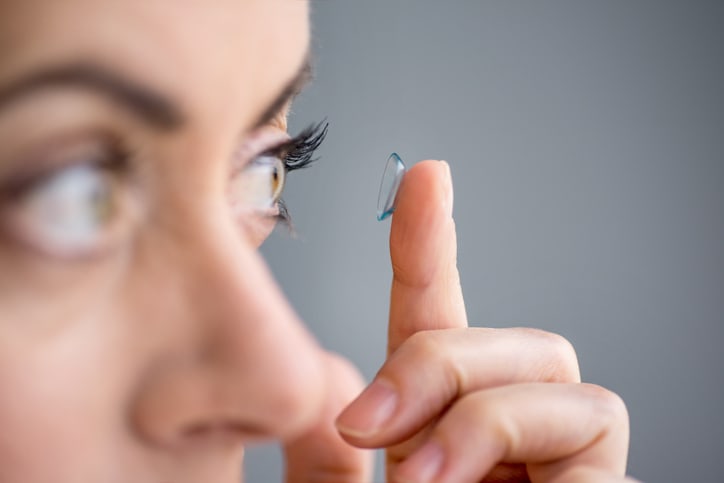
The basic method for caring for contact lenses is to clean, rinse, and disinfect. This is a pretty straightforward process. First, make sure your hands are scrupulously clean, with no residue from moisturizer or moisturizing soaps. Dry them with a lint-free towel. Place a contact lens in the palm of your hand, apply a generous amount of multipurpose contact lens solution, and rub the lens gently against your palm with your index finger, with a back and forth motion. Rinse the lens again and place it into your clean lens case, filling the case with fresh solution. Repeat the process with the other lens.
Sometimes, you’ll need to go further than just cleaning, rinsing, and disinfecting. It’s important to understand the products used in caring for lenses so that you can make the right choices for your eyes.
- Saline solution: Used for rinsing and storing contact lenses when you’re using a heat or UV disinfection system, it may also be needed with enzymatic cleaning tablets or disinfecting devices. Saline products should never be used for cleaning or disinfection.
- Daily Cleaner: This can be placed into the palm of your hand to clean your lenses, rubbing each side of the lens with your finger for at least 20 seconds. Other products are better for rinsing and disinfecting.
- Multipurpose Solution: This solution can be used for cleaning, rinsing, and disinfecting. It can also be used in the lenses case.
- Hydrogen Peroxide Solution: Used for cleaning, disinfecting, rinsing, and storing contact lenses, it’s good for users who are sensitive to the preservatives in multipurpose solution. It’s important, though, to disinfect and neutralize before putting lenses back into the eyes.
- Enzymatic Cleaner: Used to remove protein from your contact lenses, this typically involves tablets used with a saline or disinfecting solution. Always follow the instructions on the enzymatic cleaner package.
- Daily Protein Remover: Is a liquid, used during disinfection with a multipurpose solution, to remove protein from your lenses.
There are a few points to remember when cleaning contacts. First, be careful never to touch the solution bottle tip to any surface, including any part of your body. Don’t get tap water on your contact lenses or accessories, because it can carry a microorganism and lead to eye infections. Clean your contact lens accessories as directed, and throw out your contact lens case every three months to reduce the risk of infection. Don’t substitute water or any other liquid for lens solution, and make sure to clean and disinfect your lenses once a day. Follow your eye doctor’s instructions for caring for your contact lenses, and don’t switch products without consulting your doctor.
If you are looking for an eye doctor, the Gerstein Eye Institute in Chicago can help. Since 1968, the Gerstein Eye Institute has been providing exceptional ophthalmologic care to patients in the Chicago area. With decades of experience in ophthalmology, our certified professional staff members have together performed over 30,000 procedures. To schedule a consultation, call us at 773.596.9545 or contact us through our website.
-
How to Maintain Healthy Eyes as You Age

The older you get, the more your doctor emphasizes the importance of eating well and exercising to stay healthy. Good nutrition and physical activity certainly benefit your body, but making specific lifestyle changes can also help delay or prevent age-related eye diseases. Follow these tips to maintain healthy eyes as you age.
Schedule Regular Eye Exams
Annual visits to the eye doctor are recommended for everyone, but once you hit 40, regular eye exams become even more crucial. Yearly visits can help catch glaucoma, macular degeneration and other eye diseases in their early stages, making them easier to treat. Your eye doctor can also detect other non-sight related illnesses during a comprehensive eye exam, including hypertension, diabetes, STDs and some forms of cancer.
Visit the Eye Doctor if You Injure Your Eyes
It isn’t enough to rinse your injured eye under cool water and hope it gets better. If you experience vision problems or eye discomfort at any time, call your eye doctor right away. Receiving professional medical attention is the best way to safeguard your vision.
Protect Your Eyes from Bright Light
Chronic exposure to UV rays and sources of high-energy “blue light” can damage the macula, cornea and lens. To shield your eyes, try these suggestions:
- Wear dark-tinted sunglasses while outside.
- Turn on your computer’s “night light” feature to decrease the amount of blue light the screen emits.
- Wear blue-blocking computer glasses with yellow-tinted lenses.
- Illuminate your home with CFLs and LEDs that emit “warm” light.
Adopt a Healthy Diet
The food you eat doesn’t just affect your waistline – it also contributes to healthy eyes. If you eat a diet high in saturated fat and sugar, you increase your risk of eye disease. On the other hand, eating natural, healthy food can help prevent vision problems. Here’s what to include in your diet to improve eye health as you age:
- Dark green and brightly colored fruits and vegetables for vitamin A, vitamin C, lutein and zeaxanthin
- Fish, nuts and plant-based oil for omega-3 essential fatty acids
- Lean meat, legumes, fish and eggs for protein
- Whole grains to avoid the sugars in refined white flour
- Water and other sugar-free, caffeine-free drinks to stay hydrated
Quit Smoking
Smoking increases the amount of oxidative stress in your body, which can increase your chances of developing age-related macular degeneration (AMD), cataracts and glaucoma. Give up smoking, and you’ll improve nearly every aspect of your health, including your vision.
Get Enough Sleep
Maintaining a healthy sleeping pattern improves your overall well-being. It’s also a chance to rest your eyes and help them rejuvenate for the following day. Aim for at least seven hours of sleep each night. Avoid looking at your Smartphone right before bed, as the blue light of the LED screen can keep you awake.
For more tips to maintain healthy eyes as you age, or to schedule an eye exam in Chicago, IL, please contact Gerstein Eye Institute at 773.596.9545.
-
How Does Bright Light Affect Your Vision?
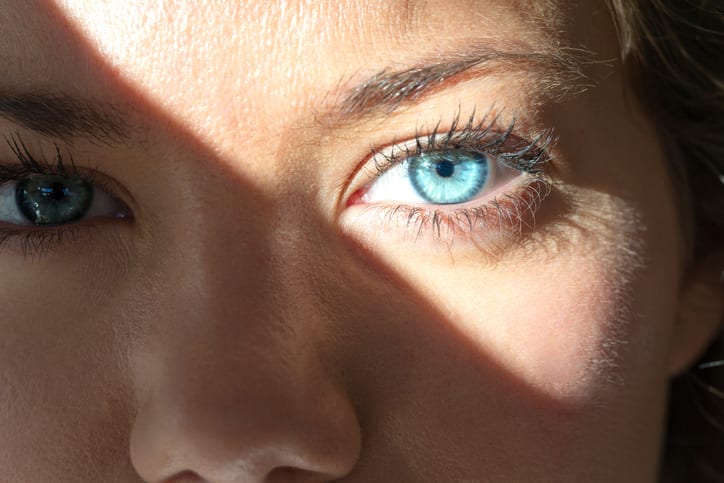
The iris serves as your eye’s main defense against bright light. This is the colored part of your eye responsible for reducing and enlarging the size of your pupil. When intense light rays reach your eye, the iris responds by constricting the pupil, thus protecting the retina and helping it process the incoming image better. The opposite occurs in low light when the iris dilates the pupil to allow as much light in as possible.
Can Bright Light Damage Your Vision?
In short, yes, staring at bright lights can damage your eyes. When the retina’s light-sensing cells become over-stimulated from looking at a bright light, they release massive amounts of signaling chemicals, injuring the back of the eye as a result.
The sun shines with such intensity that staring directly at it for just a few seconds can cause permanent retinal damage. Chronic exposure to UV rays over many weeks, months or years can also harm the macula, cornea and lens. A damaged macula leads to macular degeneration. A “sunburned” cornea can cause blurry vision and loss of eyesight. A damaged lens may develop a cataract, or clouding of the lens that blurs vision.
Blue light, even at moderate intensity levels, can damage your retinas slowly over time. Blue light has shorter wavelengths than warmer light, so it has more energy. Prolonged exposure may increase the risk of age-related macular degeneration (AMD). Sunlight is the most prominent source of blue light, but other examples include fluorescent lights, LEDs, TVs, computer monitors and Smartphone screens.
How to Treat and Prevent Eye Problems from Bright Light
Protect your vision with these tips:
- Choose glasses with anti-reflective lenses to reduce glare from bright lights.
- Wear dark-tinted sunglasses and a brimmed hat while outside. Polarized sunglasses with UV protection further shield your eyes from the effects of blue light and ultraviolet rays.
- Decrease daily screen time and take frequent breaks to rest your eyes.
- Turn on your computer’s “night light” feature to decrease the amount of blue light the screen emits.
- Wear blue-blocking computer glasses with yellow-tinted lenses that ease digital eyestrain.
- Choose CFLs and LEDs that emit “warm” light.
- If you require cataract surgery, seek blue-blocking intraocular lens (IOL) implants to protect your retinas the same way sunglasses do.
If you’re experiencing any vision problems or discomfort after exposure to bright light, visit Gerstein Eye Institute in Chicago, IL for an evaluation. Our commitment to helping patients protect their vision dates back to 1968. For more information, or to schedule an eye appointment, please contact us at 773.596.9545 today.
